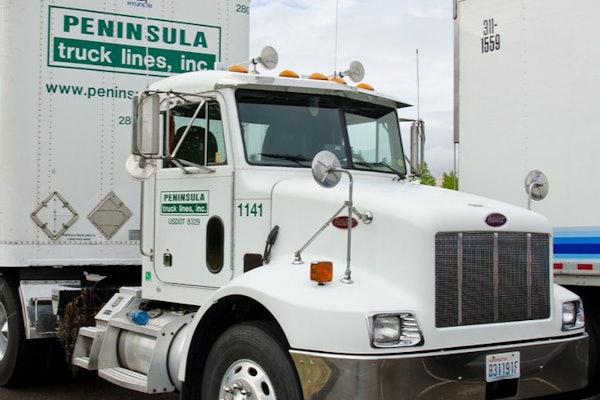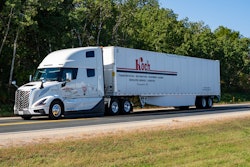Peterbilt Motor Co. announced Tuesday, April 24, that its two most aerodynamic trucks, Models 387 and 386, have been recognized as fuel-efficient and environment-friendly by the Environmental Protection Agency’s SmartWay program, which establishes a comprehensive set of fuel-saving, low-emissions equipment specifications for new Class 8 longhaul tractors and trailers.
Peterbilt says its SmartWay-compliant vehicles customers fuel savings of between 10 and 20 percent, lower greenhouse gas emissions and significantly reduced NOx, particulate matter and other air pollutants. “The EPA’s SmartWay program is a valuable asset for fleets and customers seeking verification of the industry’s leading aerodynamic solutions,” says Bill Jackson, general manager of Denton, Texas-based Peterbilt and Paccar vice president. “Peterbilt is setting the pace for state-of-the-art aerodynamic designs optimized to improve airflow and fuel efficiency.”
Components required for the SmartWay-eligible designation include engines certified to the new 2007 emissions standards, high roof fairings, fuel tank side fairings, aerodynamic bumpers and mirrors, anti-idling options and low rolling-resistance tires.
“As customers increasingly focus on their daily operating expenses due to rising fuel costs, sales of aerodynamically-styled, fuel-efficient trucks continue to climb and account for the majority of the Class 8 on-highway market today,” says Scott Pearson, Peterbilt assistant general manager of sales and marketing. “As a result, Peterbilt has made significant investment in the expansion of aerodynamic products to help customers in this growing market.”
Peterbilt says its complete new vehicle lineup provides customers with competitive advantages through more fuel-efficient aerodynamic designs, reduced chassis weight, improved serviceability and reliability, and greater overall performance. The company says it also continues development and testing vehicles equipped with advanced hybrid technologies that increase fuel efficiency, reduce emissions and improve service requirements. Peterbilt’s hybrid initiatives include development of both medium- and heavy-duty vehicle platforms and for both on-highway and vocational applications, offering hybrid solutions to serve a broad range of customers to help them reduce operating expenses and to foster greater environmental stewardship.
In March, Peterbilt announced the latest of its hybrid initiatives, a hybrid electric Class 8 Model 386 configured for longhaul applications. It combines the aerodynamic efficiency of the Model 386 with a parallel-type “direct” electric hybrid system. The heavy-duty hybrid electric Model 386, configured for on-highway use, is being developed in conjunction with Eaton and Wal-Mart Stores. It is currently in the testing and evaluation phase and is expected to be available in 2010. Wal-Mart, which operates the nation’s second-largest private fleet, is supporting development by helping validate the concept and refine the final design.








